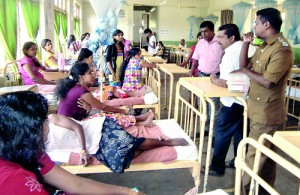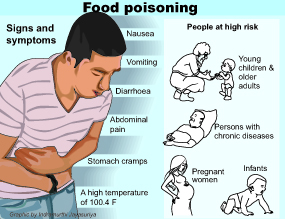News
Raids find food workers unaware of safety regulations
Workers at a garment factory in Dharga Town, Aluthgama reported for duty and set to work as usual one day last week. During the lunch break they were served rice, chicken curry and vegetables.
Shortly after lunch most of them began exhibiting signs of illness. Some vomited, some had headaches and diarrhoea. They were rushed to nearby hospitals; some 157 workers sought medical treatment.

Factory employees receiving treatment. Pic by S. Siriwardena
Public Health Inspectors (PHIs) quickly arrived at the factory for investigations. Preliminary reports revealed the cause of the food poisoning to be the chicken that was consumed, but the Government Analyst’s reports, due next week, will give more details.
The Sunday Times learns that the PHIs, who checked where the meals were cooked, had found that the food preparation area, where the chicken was cut up for cooking, lay beside waste drainage and was unhygienic.
The Beruwala Medical Health Officer (MOH) has arranged a special discussion on the above incident in the garment factory premises tomorrow.
The incident was one among a string of recent cases of food poisoning.
Thirty-eight students from the Akurana area were hospitalised with food poisoning after eating kola kende on January 21, and more than 350 people attached to a garment factory in the Poruwadanda area in Horana suffered from food poisoning after consuming food at an event held on January 2.
In November last year, 56 student cadets and 25 staff of the National Cadet Training Headquarters in Randenigala were taken to hospital with food poisoning after eating at their canteen the previous night.
In the Wellawaya area, 14 women were hospitalised after eating a birthday cake bought from a shop.
“Foods that are rich in protein such as meat, chicken and eggs are categorised as high-risk in terms of possible contamination,” said Dr. S. Nagaiah, Consultant to the Food Control and Administration Unit at the Ministry of Health.
He said controlling time, temperature and moisture while cooking was the main means of preventing the multiplication of bacteria such as salmonella, a common microorganism that grows on cooked food items. “The prepared food should be consumed within four hours, and if it is kept more than six hours before being consumed it should be kept in a refrigerator or be destroyed,” he said.
 “There are a few drawbacks in the field of food handling in Sri Lanka,” said Dr. Nagaiah.
“There are a few drawbacks in the field of food handling in Sri Lanka,” said Dr. Nagaiah.
“Although there are mass catering establishments, we hardly see them using proper food-handling methods or being knowledgeable about food microbiology which would teach them that proper hand-washing before handling food is a basic precaution and a must.”
He told the Sunday Times that even though health inspectors are instructed and trained to educate food handlers, it was evident from random raids that none of these practices were followed by food handlers who seemed to be ignorant of any of the required procedures.
Dr. Nagaiah also said that regulations needed to be added to the Food Act to compel owners of food establishments to register their outlets with the MOH. Although existing provisions of the Food Act prescribed certain criteria to such registration there was no actual legislation.
Assistant Director of Food Control Administration Unit H. Tilakeratne said that inspections in 10 major areas such as water supply, personal hygiene, waste control, toilets and building conditions were being carried out to bring about improvements in food preparation.
“In addition to the training sessions conducted by PHIs and MOH, we have instructed midwives to deliver short discussions with mothers about ways of preventing cross-contamination of food in households,” he said.
The Food Act mandates that all food items be kept in well-protected conditions until consumption, and severe violation of the law will result in a jail terms of up to six months, Mr Tilakeratne said. The courts may also order him to publish the names of repeat offenders in the newspapers, he said.
Deputy Director (Public Health) of the Ministry of Health Dr. Sarath Amunugama said most food poisoning cases resulted from irregular catering at events such as weddings where PHI inspections did not exist.


